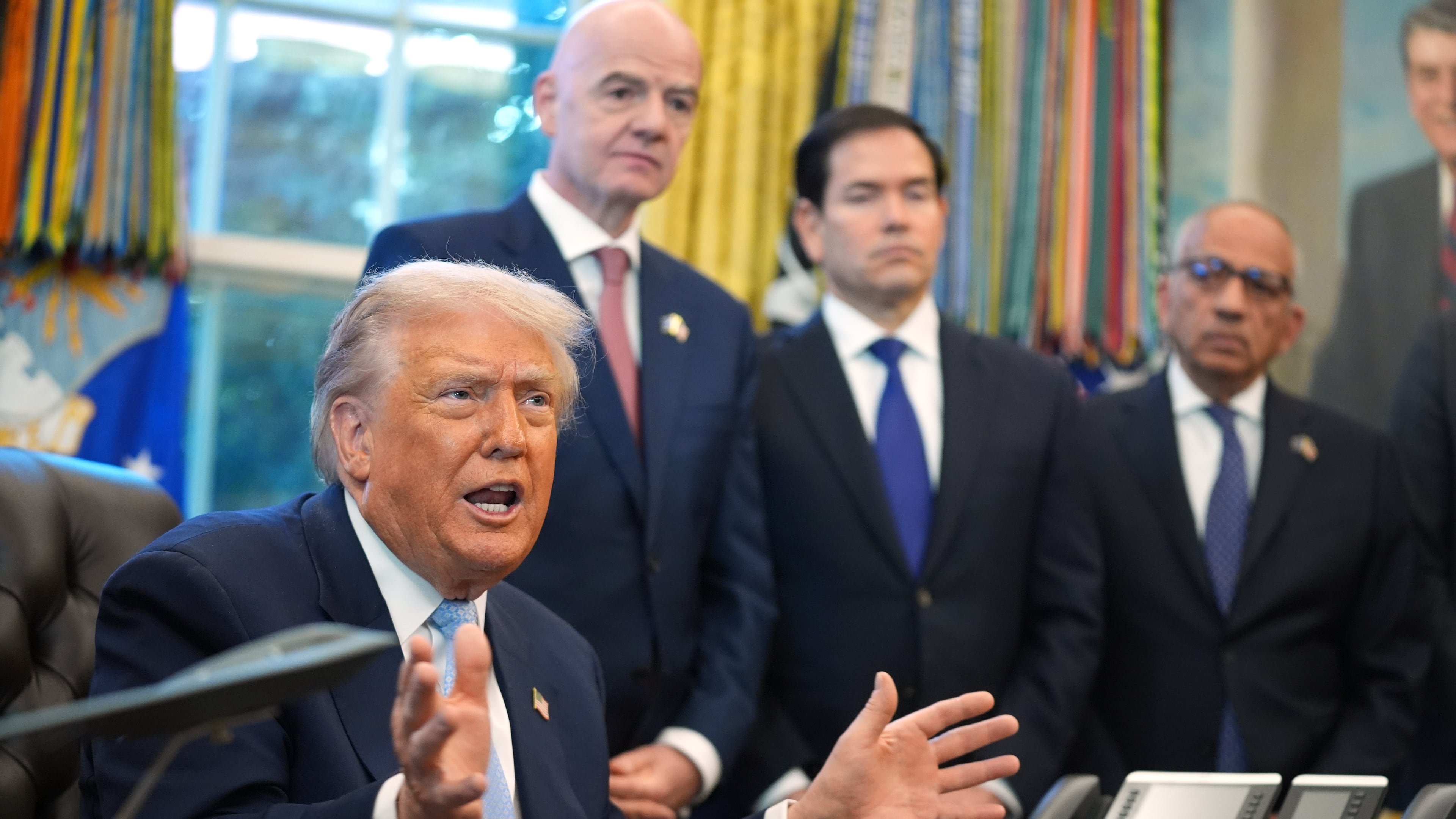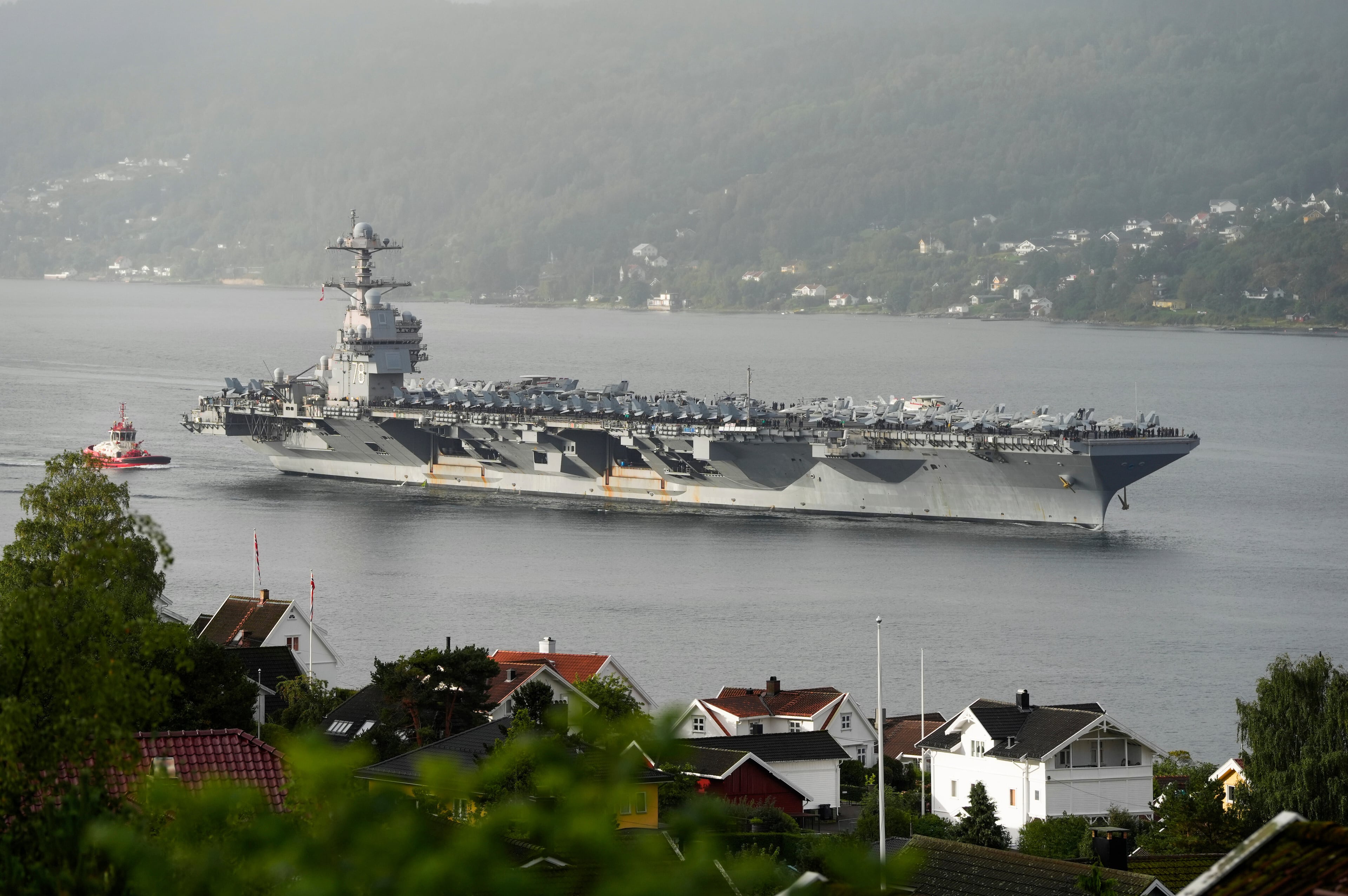Trump leaves military action against Venezuela on the table but floats possible talks

WASHINGTON (AP) — President Donald Trump on Monday did not rule out military action against Venezuela despite bringing up a potential diplomatic opening with leader Nicolás Maduro, who has insisted that a U.S. military buildup and strikes on alleged drug boats near his South American country are designed to push him out of office.
Trump reiterated that he “probably would talk to” Maduro, but underscored that he is not taking off the table the possibility of military action on Venezuelan territory.
“I don’t rule out that. I don’t rule out anything,” Trump told reporters in the Oval Office a day after he first floated the possibility of having “discussions” with Maduro. Trump, however, sidestepped questions about whether Maduro could say anything to him that would lead to the U.S. backing off its military show of force.
“He’s done tremendous damage to our country,” said Trump, tying Maduro to drugs and migrants coming into the U.S. from Venezuela. “He has not been good to the United States, so we’ll see what happens.”
The comments deepened the uncertainty about the Trump administration's next steps toward Maduro's government. The U.S. has ratcheted up the pressure in recent days, saying it was expecting to designate as a terrorist organization a cartel it says is led by Maduro and other high-level Venezuelan government officials.
The USS Gerald R. Ford and accompanying warships arrived in the Caribbean this weekend just as the U.S. military announced its latest in a series of strikes against vessels suspected of transporting drugs.
‘Can turn policy on a dime’
The administration says its actions are a counterdrug operation meant to stop narcotics from flowing to American cities, but some analysts, Venezuelans and the country’s political opposition see them as an escalating pressure tactic against Maduro.
The Trump administration has shown it “can turn policy on a dime,” said Geoff Ramsey, an expert on U.S. policy toward Venezuela who is a nonresident senior fellow at the Atlantic Council. He pointed to the diplomatic talks the administration held with Iran “right up until the point” that the U.S. military targeted Iran’s nuclear facilities in June.
But, Ramsey added, the timing of Trump’s remarks — after Secretary of State Marco Rubio’s announcement of the impending terrorist designation of the Cartel de los Soles — underscores that the administration does not want to repeat failed attempts at dialogue.
“They really want to negotiate from a place of strength, and I think the White House is laying out an ultimatum for Maduro,” Ramsey said. “Either he engages in credible talks about a transition, or the U.S. will have no choice but to escalate.”
Maduro has negotiated with the U.S. and Venezuela's political opposition for several years, most notably in the two years before the July 2024 presidential election. Those negotiations resulted in agreements meant to pave the way for a free and democratic election, but Maduro repeatedly tested their limits, ultimately claiming victory despite credible evidence that he lost the contest by a 2-to-1 margin.
Among the concessions the U.S. made to Maduro during negotiations was approval for oil giant Chevron Corp. to resume pumping and exporting Venezuelan oil. The corporation’s activities in the South American country resulted in a financial lifeline for Maduro’s government.
Neither Maduro nor his chief negotiator, National Assembly president Jorge Rodriguez, commented Monday on Trump’s remarks. A spokesperson for Venezuelan opposition leader and Nobel Peace Prize winner María Corina Machado told reporters Monday that she would not comment on Trump’s remarks.
Trump also talks about Mexico
Trump didn’t even rule out possible military action against close allies in the region.
“Would I want strikes in Mexico to stop drugs? OK with me, whatever we have to do to stop drugs,” Trump said, adding that he’s “not happy with Mexico.”
Trump said the U.S. government has drug corridors from Mexico “under major surveillance” and said he would also like to target Colombia’s “cocaine factories.”
“Would I knock out those factories? I would be proud to do it personally. I didn’t say I’m doing it — but I would be proud to do it,” he said.
Skepticism and hope in Venezuela about possible talks
Trump’s goal on Venezuela remains unclear, but above all, Ramsey said, the president “is looking for a win.”
“And he may be flexible on exactly what that looks like,” Ramsey said. “I could envision the U.S. pushing for greater control over Venezuela’s natural resources, including oil, as well as greater cooperation with the president’s migration and security goals.”
In Venezuela's capital, Caracas, people responded with skepticism and hope to the possibility of a new dialogue between the U.S. and Maduro, whose government has fueled rumors of a ground invasion despite the Trump administration giving little clear indication of such a plan.
“If (the dialogue) actually happens, I hope the government will actually follow through this time," shopkeeper Gustavo García, 38, said as he left church. "We have to be serious. They’ve gotten us used to them talking, but they don’t honor the agreements. You don’t mess with Trump.”
Stay-at-home mother Mery Martínez, 41, said, “Talking is always better.”
“Anything that helps prevent a tragedy is good," Martínez said. “Venezuelans don’t deserve this. A war benefits no one.”
___
Garcia Cano reported from Caracas, Venezuela. Associated Press writer Jorge Rueda in Caracas contributed to this report.
